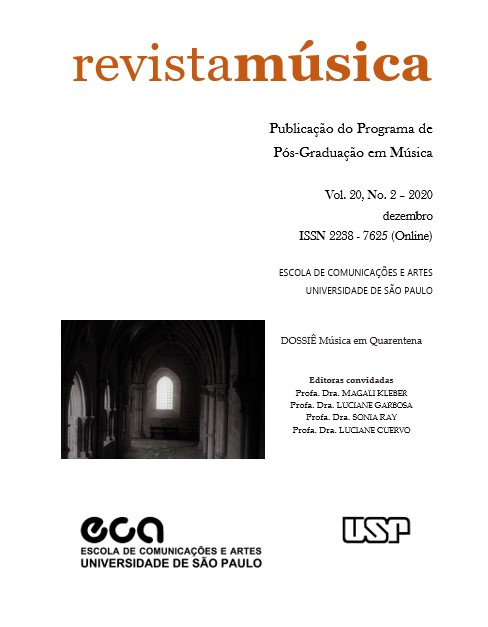Mbira Music: Magnifying lenses and reflections of the concept(s) and meaning(s) of Music
DOI:
https://doi.org/10.11606/rm.v20i2.175175Keywords:
Music concepts, sociocultural interrelationships, Mbira MusicAbstract
This work presents, discusses, and proposes, through Mbira Music, an integrative approach as part of an open understanding of the concepts of music in their socio-cultural dimensions. For this, I take as a base procedure bibliographic research around the studies of (Ethno)musicologists, Anthropologists, and related assumptions, articulating with my participant observation and training experiences in African musical culture. The results point to a more consolidated understanding of the concepts of Music, covering other processes and non-sound processes that are established, shared, and re-signified musically, culturally, and socially within a specific group inserted in society. I reiterate that the sound elements do not happen by themselves, they are articulated by countless motivations and memories that direct us to its role as a product and social process that outlines common situations in a broader network of human relationships.
Downloads
References
AMAOKU, W. Komla. Toward a Definition of Traditional African Music: A look at the Ewe of Ghana. More than Drumming: Essays of African and AfroLatin American Music and Musicians. Edited by Irene V. Jackson. Westport: Greenwood Press, p. 31-39. 1985.
AUBERT, Laurent. The music of the other: new challenges for ethnomusicology in a global age. Traduzido por Carla Ribeiro. Aldershot: Ashgate, 2007.
BERLINER, Paul. The soul of Mbira: music and traditions of the Shona people of Zimbabwe. Berkeley: University of California Press, 1978.
BLACKING, John. How musical is man? Seattle: University of Washington Press, 1995b, 5 ed. [1973]. 116 p.
BLACKING, John. Music, culture & experience: selected papers of John Blacking. Edited by Reginald Byron; with foreword by Bruno Nettl. Chicago, USA: University of Chicago Press, 1995.
BOHLMAN, Philip Vilas. Music and Culture: Historiographies of Disjuncture. In: CLAYTON, Martin; HERBERT, Trevor; MIDDLETON, Richard (ed.). The cultural study of music: a critical introduction. New York: Routledge. 2003, p. 49 – 60.
CHÁVEZ, Luis. SKELCHY, Russell P. Decolonization for Ethnomusicology and Music Studies in Higher Education. Action, Criticism, and Theory for Music Education. Sep. 2019, v. 18, n. 3, p. 115–43. Disponível em: https://doi.org/10.22176/act18.3.115. Acesso em: 10 de Junho de 2020.
COOK, Nicholas. Music, imagination and culture. Oxford: Clarendon Press. 1990.
CROSS, Ian. Music and Biocultural Evolution 19. In: CLAYTON, Martin; HERBERT, Trevor; MIDDLETON, Richard (ed.). The cultural study of music: a critical introduction. New York: Routledge. 2003, p. 24-35.
FAULKNER, P.; RUNDE, J. Technological objects, social positions, and the transformational model of social activity. MIS Quarterly, v. 37 n. 3, 2013, p. 803-818.
FELD, Steven. Sound and sentiment: Birds, weeping, poetics and song in Kaluli experience. 2ed. Philadelphia: Univ. of Pennsylvania Press. 1990.
FINNEGAN, Ruth. Music, Experience, and the Anthropology of Emotion. In: CLAYTON, Martin; HERBERT, Trevor; MIDDLETON, Richard (ed.). The cultural study of music: a critical introduction. New York: Routledge. 2003, p. 185-196.
GREEN, Lucy. Music Education, Cultural Capital, and Social Group Identity. In: CLAYTON, Martin; HERBERT, Trevor; MIDDLETON, Richard (ed.). The cultural study of music: a critical introduction. New York: Routledge. 2003, p. 268-277.
HALL, Stuart. Da diáspora: Identidades e mediações culturais. Tradução Adelaine La Guardia Resende, et al. Belo Horizonte: Editora UFMG, 2003.
HOFMAN, Ana. Disobedient: Activist Choirs, Radical Amateurism, and the Politics of the Past after Yugoslavia. The Society for Ethnomusicology, v. 64, No. 1, 2020. Disponível em: https://www.jstor.org/stable/pdf/10.5406/ethnomusicology.64.1.0089.pdf. Acesso em 06 de junho de 2020.
MAPAYA, Madimabe Geoff. Dipsticking the Study of Indigenous African Music from the John Blacking Era into the 21st Century. Pretoria: Centre for Advanced Studies of African Society. 2018.
MERRIAM, Alan Parkhurst. The anthropology of Music. Chicago, USA: Northwestern University Press, 1964.
MUCAVELE, Lucas Johane. Applied organology: challenges and potentials of traditional musical instruments in present-day contexts: Xizambi, Ximbvokombvoko, and Mbira. África [s] - Revista do Programa de Pós-Graduação em Estudos Africanos e Representações da África, v. 5 (9), p. 97-116, 2018. Disponível em: https://web.archive.org/web/20200805232819/http://www.revistas.uneb.br/index.php/africas/article/download/5430/3425 Acesso em: 21 Set 2020.
NEGUS, Keith. Popular Music in Theory: An introduction. England: Wesleyan University Press. 1997.
NETTL, Bruno. Music Education and Ethnomusicology: A (Usually) Harmonious Relationship. Min-Ad: Israel Studies in Musicology Online, Ramat-Gan, Israel, v. 8, n. 1, p. 1-9, 2010. Disponível em: <http://www.biu.ac.il/hu/mu/min-ad/index.htm>. Acesso em: 17 Janeiro 2019.
NZEWI, Meki. A CONTEMPORARY STUDY OF MUSICAL ARTS: Informed by African Indigenous knowledge systems. Pretoria: Centre for Indigenous Instrumental African Music and Dance (CIIAMDA). 2007. Volume 2.
RIBEIRO, Fábio Henrique Gomes. Performance musical na cultura popular contemporânea de João Pessoa/PB/. Fábio Henrique Gomes Ribeiro. - João Pessoa. 2017, 406f. : il. Tese (Doutorado em Música) Programa de Pós-Graduação em Música da Universidade Federal da Paraíba. 2017.
TITON, Jeff Todd. Textual Analysis or Thick Description? In The cultural study of music: a critical introduction. Editado por CLAYTON, Martin; HERBERT, Trevor; MIDDLETON, Richard. New York: Routledge. 2003. p. 175-184.
Downloads
Published
Issue
Section
License
Copyright (c) 2020 Micas Orlando Silambo

This work is licensed under a Creative Commons Attribution-NonCommercial-ShareAlike 4.0 International License.
Autores que publicam nesta revista concordam com os seguintes termos:
- Autores mantém os direitos autorais e concedem à revista o direito de primeira publicação, com o trabalho simultaneamente licenciado sob a CC Attribution-NonCommercial-ShareAlike 4.0 que permite o compartilhamento do trabalho com reconhecimento da autoria e publicação inicial nesta revista.
- Autores têm autorização para assumir contratos adicionais separadamente, para distribuição não-exclusiva da versão do trabalho publicada nesta revista (ex.: publicar em repositório institucional ou como capítulo de livro), com reconhecimento de autoria e publicação inicial nesta revista.
- Autores têm permissão e são estimulados a publicar e distribuir seu trabalho online (ex.: em repositórios institucionais ou na sua página pessoal) a qualquer ponto antes ou durante o processo editorial, já que isso pode gerar alterações produtivas, bem como aumentar o impacto e a citação do trabalho publicado (Veja O Efeito do Acesso Livre).


